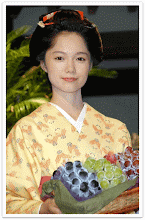The Art of Tea Ceremony is long renown as one of the high arts of Japanese Culture. It is steeped in Japanese history tracing its roots back to the great Tea Master Rikyu of the Warring States Period. Once considered the sole domain of the powerful warlords and prominent individuals of the wealthier classes, Tea Ceremony also known as the Chanoyu has since become a signature cultural contribution on the world stage rich in beauty and elaborate ritual. So when the opportunity came up to win a chance to partake in such ritual, we naturally jumped at the chance.
As luck would have it, we were selected among five winners to partake as guests in a Tea Ceremony hosted by the Japanese American National Museum in Little Tokyo last February 22, 2014. The event itself was held in their side theater which was set up complete with shoji screens and all the implements needed to perform the tea ceremony. The ceremony itself would be conducted by several kimono clad ladies (whose names we were unable to acquire) under the watchful eye of their tea master Hamano Shachu of Urasenke. The event held that Saturday had around fifty people in attendance and was part lecture, part demonstration, and part question / answer session.
Normally, one could expect to be seated in the traditional seiza position on tatami mat as one could conjure from a Japanese Period drama. But in our case we were seated on small folding chairs. As explained by our most gracious host this form of seating came about when westerners arrived and could not sit in the traditional seated posture. Thus the ceremony itself was modified for western participants. Having spent many a lecture in the seiza position back in our Kendo days where there were no tatami mats to rest upon, we certainly appreciated this simple amendment to the Chanayu.
As a guest, we were given a specific set of instructions in tea etiquette such as how to receive the tea cup. How to hold the tea cup, how to drink the green “ocha”, as well as when to say “Osakini (polite) ” to the person next to you before you complete the cycle with the person seated next to you. We were also treated to special sweats wrapped in green leaf whose purpose was designed to take the bitterness from the tea. While this demonstration took place on a small theater stage, it was not without its dutiful grace and elaborate ceremony.
We were pleased to learn that Ms. Hamano Shachu offers education in Tea Ceremony here in the United States and even has her own private tea room. She says it takes ten years of training to become a tea master. With the precise execution and strict adherence to tradition we can see why and appreciate this most unique cultural experience. If ever an opportunity arises for you to partake in a tea ceremony, we highly recommend it.
We at American Mishima would like to thank Ms. Hamano Shachu (seen left) and her staff as well as the Japanese American National Museum for a most educational and culturally enriching experience!
If you would like to learn more about events hosted by the Japanese American National Museum,
Please visit their website at The Japanese American National Musuem


























No comments:
Post a Comment